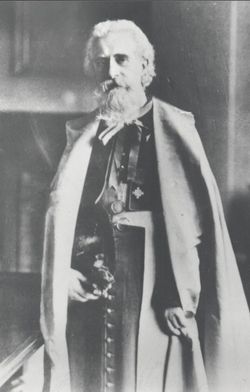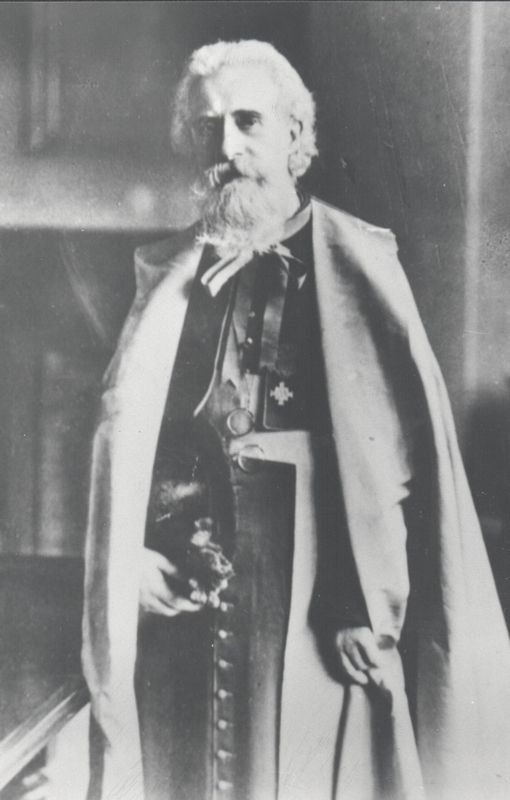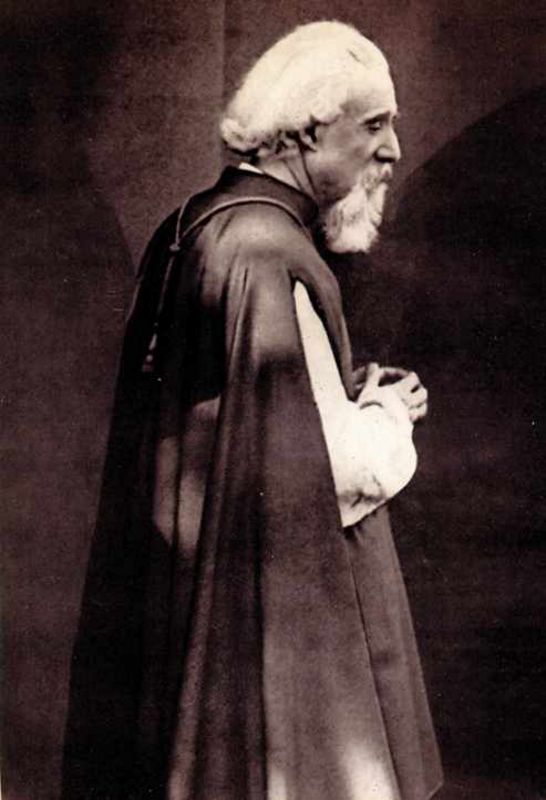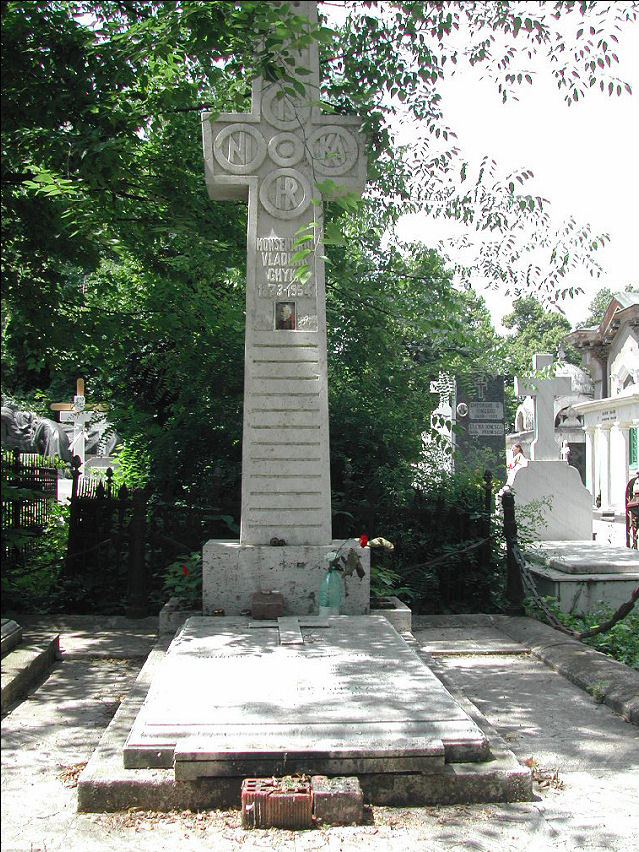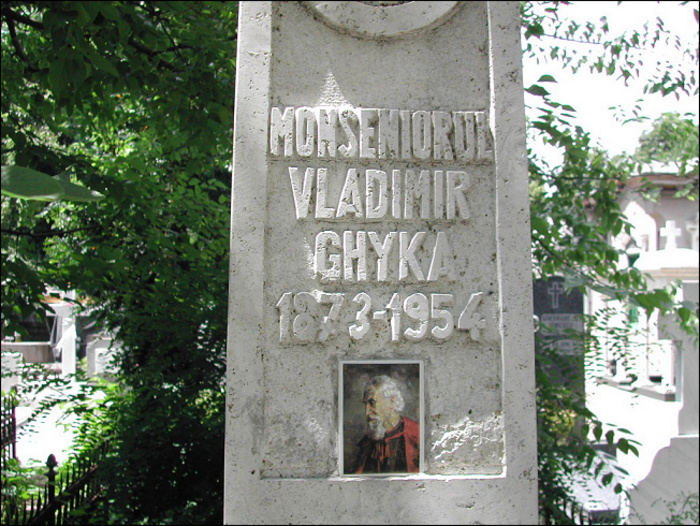Meeting Sister Pucci of Congregation of Saint Vincent de Paul in Salonicka in 1904, he was introduced to her apostolate among the sick and dying. Soon, out of his personal wealth, he founded a dispensary in Bucharest run by the Daughters of Charity of whom Sister Pucci would be the first superior. In 1913, Prince Ghika, with Sister Pucci, organized the Saint Vincent Hospital, a lazaretto for cholera victims.
After the First World War, Vladimir settled in Paris, where his brother had been named Romanian Ambassador. Princess Alexandrine, his mother, had died in 1914 and thus he was ultimately ordained by the Archbishop of Paris on October 7, 1923 with the privilege of celebrating according to the two rites, Latin and Byzantine.
Hoping to establish a religious society, Pope Pius XI authorized his foundation in 1924 but when the project failed, he devoted himself to a new one: living as a missionary in the most deprived Parisian suburb, Villejuif, in a shantytown populated by rag pickers.
In 1931, Pius XI gave Father Ghika the title of Protonotary Apostolic. His apostolate led him as far away as Japan and Argentina while in September 1939 he obtained authorization from the Archbishop of Paris to move to Romania, where Polish refugees were arriving in droves, fleeing Soviet or German occupation. In Bucharest, throughout the Second World War, he carried out a tireless ministry for the refugees, sick, prisoners and victims of bombings.
With the Soviet army entering Romania in August 1944, Prince Demeter Ghika left in exile but Vladimir did not resign himself to abandoning the persecuted Romanian Christians. Evicted from his home, which was ransacked, then from Saint Vincent de Paul Hospital, Monsignor Ghika took shelter in an attic and continued his apostolate, comforting, converting, baptizing, in spite of close surveillance by the police.
Called on November 18, 1952, to the bedside of a dying man, Ghika was forced on the way into a car by two plain clothes police officers. He was put into military prison, where twenty other "suspects", all had been accused of spying for the Vatican. Monsignor Ghika stayed there for close to a year in undergarments and without spare clothes. Over the course of more than eighty night-time interrogations, he was slapped, beaten and tortured to the point of temporary loss of hearing and sight.
On October 24, 1953, Monsignor Ghika, then in his eighties, came before his judges, standing, indomitable, weighing less than 50 kilos, though 1.76 meters tall. After a sham trial, he was condemned to three years of imprisonment and thrown into the dungeon of the Julava prison, dripping with humidity, where 240 inmates were packed in. Some of them offered him their clothing. All of them flocked around him and benefited from his ministry. He preached, recounted memories from the past, and a bit of joy shone on the faces which surrounded him.
Even though Monsignor Ghika was unable to celebrate Mass, the terrible dungeon had become a church. The guards could not comprehend where the joy that brightened the prisoners' faces had come from. The absence of breathable air in the overpopulated cell, the lack of basic hygiene and food, and the terrible cold of the winter of 1953 - 1954 depleted his strength, though not his courage. In January 1954, prisoner Ghika was classified incapable of work and transferred to the infirmary, where he slowly faded away in a state of constant prayer. He was heard to say, "Lord, do not abandon me. I embrace Your Love to triumph over the hate of my enemies..." He offered his life for the Church and for Romania. On May 17, he went to his final rest in the Lord. "Our death," he had written, "should be the greatest act of our lives. But God may be the only one who witnesses it..."
Ghika was beatified in the Romexpo Arena, Bucharest, on August 31, 2013, in a ceremony presided by Cardinal Angelo Amato SDB., Prefect of the Congregation for the Causes of Saints.
Meeting Sister Pucci of Congregation of Saint Vincent de Paul in Salonicka in 1904, he was introduced to her apostolate among the sick and dying. Soon, out of his personal wealth, he founded a dispensary in Bucharest run by the Daughters of Charity of whom Sister Pucci would be the first superior. In 1913, Prince Ghika, with Sister Pucci, organized the Saint Vincent Hospital, a lazaretto for cholera victims.
After the First World War, Vladimir settled in Paris, where his brother had been named Romanian Ambassador. Princess Alexandrine, his mother, had died in 1914 and thus he was ultimately ordained by the Archbishop of Paris on October 7, 1923 with the privilege of celebrating according to the two rites, Latin and Byzantine.
Hoping to establish a religious society, Pope Pius XI authorized his foundation in 1924 but when the project failed, he devoted himself to a new one: living as a missionary in the most deprived Parisian suburb, Villejuif, in a shantytown populated by rag pickers.
In 1931, Pius XI gave Father Ghika the title of Protonotary Apostolic. His apostolate led him as far away as Japan and Argentina while in September 1939 he obtained authorization from the Archbishop of Paris to move to Romania, where Polish refugees were arriving in droves, fleeing Soviet or German occupation. In Bucharest, throughout the Second World War, he carried out a tireless ministry for the refugees, sick, prisoners and victims of bombings.
With the Soviet army entering Romania in August 1944, Prince Demeter Ghika left in exile but Vladimir did not resign himself to abandoning the persecuted Romanian Christians. Evicted from his home, which was ransacked, then from Saint Vincent de Paul Hospital, Monsignor Ghika took shelter in an attic and continued his apostolate, comforting, converting, baptizing, in spite of close surveillance by the police.
Called on November 18, 1952, to the bedside of a dying man, Ghika was forced on the way into a car by two plain clothes police officers. He was put into military prison, where twenty other "suspects", all had been accused of spying for the Vatican. Monsignor Ghika stayed there for close to a year in undergarments and without spare clothes. Over the course of more than eighty night-time interrogations, he was slapped, beaten and tortured to the point of temporary loss of hearing and sight.
On October 24, 1953, Monsignor Ghika, then in his eighties, came before his judges, standing, indomitable, weighing less than 50 kilos, though 1.76 meters tall. After a sham trial, he was condemned to three years of imprisonment and thrown into the dungeon of the Julava prison, dripping with humidity, where 240 inmates were packed in. Some of them offered him their clothing. All of them flocked around him and benefited from his ministry. He preached, recounted memories from the past, and a bit of joy shone on the faces which surrounded him.
Even though Monsignor Ghika was unable to celebrate Mass, the terrible dungeon had become a church. The guards could not comprehend where the joy that brightened the prisoners' faces had come from. The absence of breathable air in the overpopulated cell, the lack of basic hygiene and food, and the terrible cold of the winter of 1953 - 1954 depleted his strength, though not his courage. In January 1954, prisoner Ghika was classified incapable of work and transferred to the infirmary, where he slowly faded away in a state of constant prayer. He was heard to say, "Lord, do not abandon me. I embrace Your Love to triumph over the hate of my enemies..." He offered his life for the Church and for Romania. On May 17, he went to his final rest in the Lord. "Our death," he had written, "should be the greatest act of our lives. But God may be the only one who witnesses it..."
Ghika was beatified in the Romexpo Arena, Bucharest, on August 31, 2013, in a ceremony presided by Cardinal Angelo Amato SDB., Prefect of the Congregation for the Causes of Saints.
Sponsored by Ancestry
Advertisement
Explore more
Sponsored by Ancestry
Advertisement
